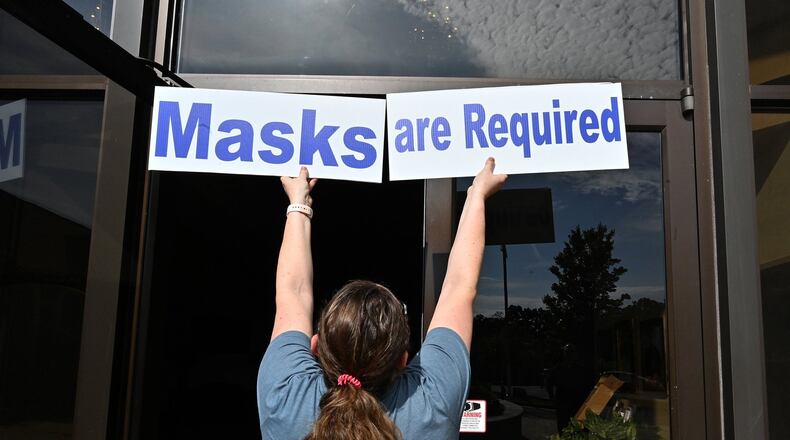Almost as soon as Gov. Brian Kemp let it be known he would reverse course and allow local governments to impose mask mandates, Sandy Springs Mayor Rusty Paul announced the Atlanta suburb would draft an order to comply with the new guidance.
It won’t be the only one. In the aftermath of Kemp’s about-face, other cities and counties that were previously reluctant to defy the governor’s ban on mask requirements are now racing to enact them.
After long opposing mandates as unnecessary and unenforceable, Kemp signed an executive order Saturday that lets most local governments require masks in shops and other private businesses so long as the owner consents and the ordinance meets other guidelines.
The turnabout came after Kemp abruptly withdrew a lawsuit he filed against the city of Atlanta over its mask requirement, blaming Mayor Keisha Lance Bottoms for “trying to start shutting businesses down” by recommending new “phase one” economic guidelines.
“I still believe a statewide mask mandate isn’t the way to go, and I don’t believe you have to have a mask mandate to do the right thing,” he said during a Monday conference call.
Bottoms has called his comments about the scuttled courtroom case “woefully inaccurate” and lamented the resources wasted in the legal feud.
Kemp’s decision allowed the roughly 15 Georgia cities and counties with broad mask mandates to keep them on the books — and cleared the way for more to join their ranks. (Separately, about 100 cities also require masks on government property, which are also permitted by Kemp’s order.)
Credit: Stephen B. Morton
Credit: Stephen B. Morton
Over the weekend, discussions bubbled up in cities, suburbs and small towns about how to respond. Michael Thurmond, the chief executive of DeKalb County, which adopted its face-covering requirements in July, predicted an avalanche of others would now follow suit.
Larry Hanson, the executive director of the Georgia Municipal Association, had the same inkling.
“From what we are hearing, we anticipate a number of cities and counties will be adopting policies and ordinances,” he said.
Among them are local leaders in Hancock County, which has the highest COVID-19 death rate per 100,000 people in the nation, according to the COVID Racial Data Tracker. Some 35 people have died from the disease in Hancock, a rural community home to 8,500.
Hancock County Commission Chair Sistie Hudson said officials will “absolutely” adopt a mask ordinance. So did Allen Haywood, the mayor of Hancock’s seat of Sparta, a town of roughly 1,200 people whose residents are mostly older and Black — two groups disproportionately afflicted by the coronavirus.
“We want to make sure we are helping look after their health,” he said, adding: “It’s very serious, especially when you have got so many people with preexisting conditions.”
The Latest
Featured





